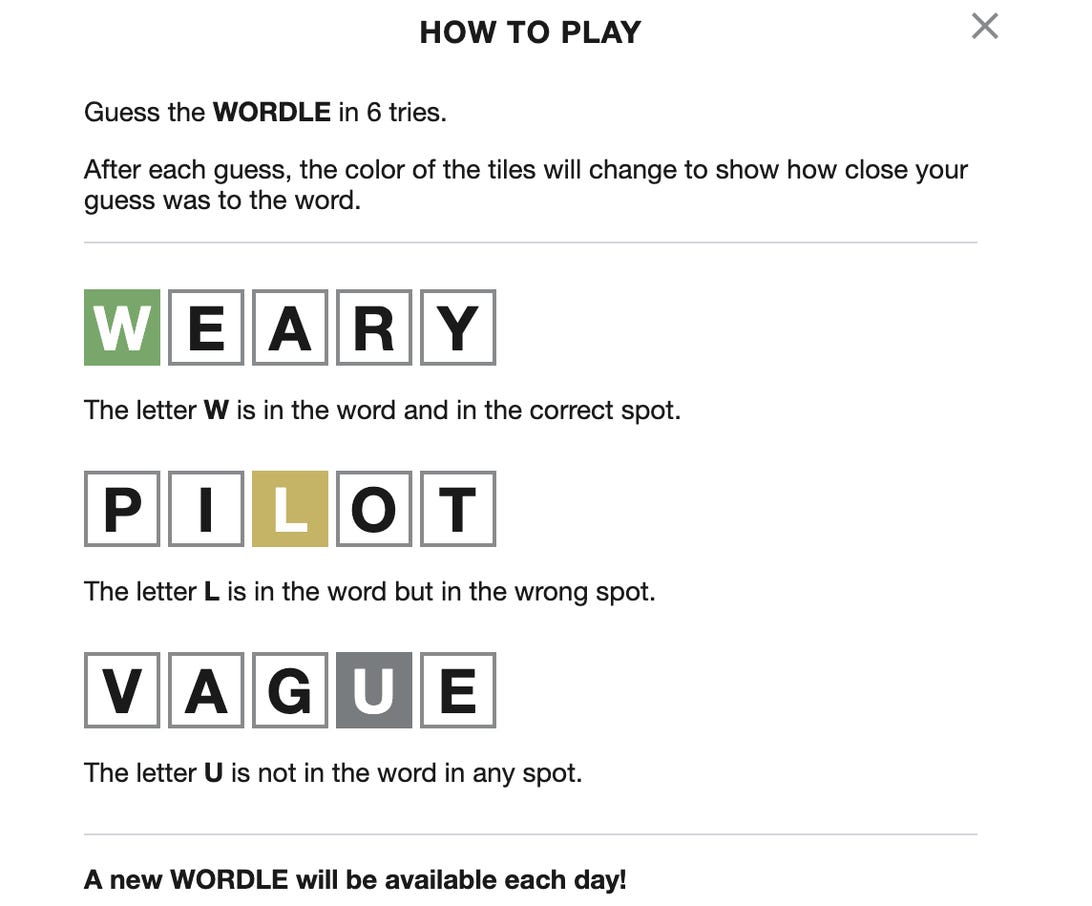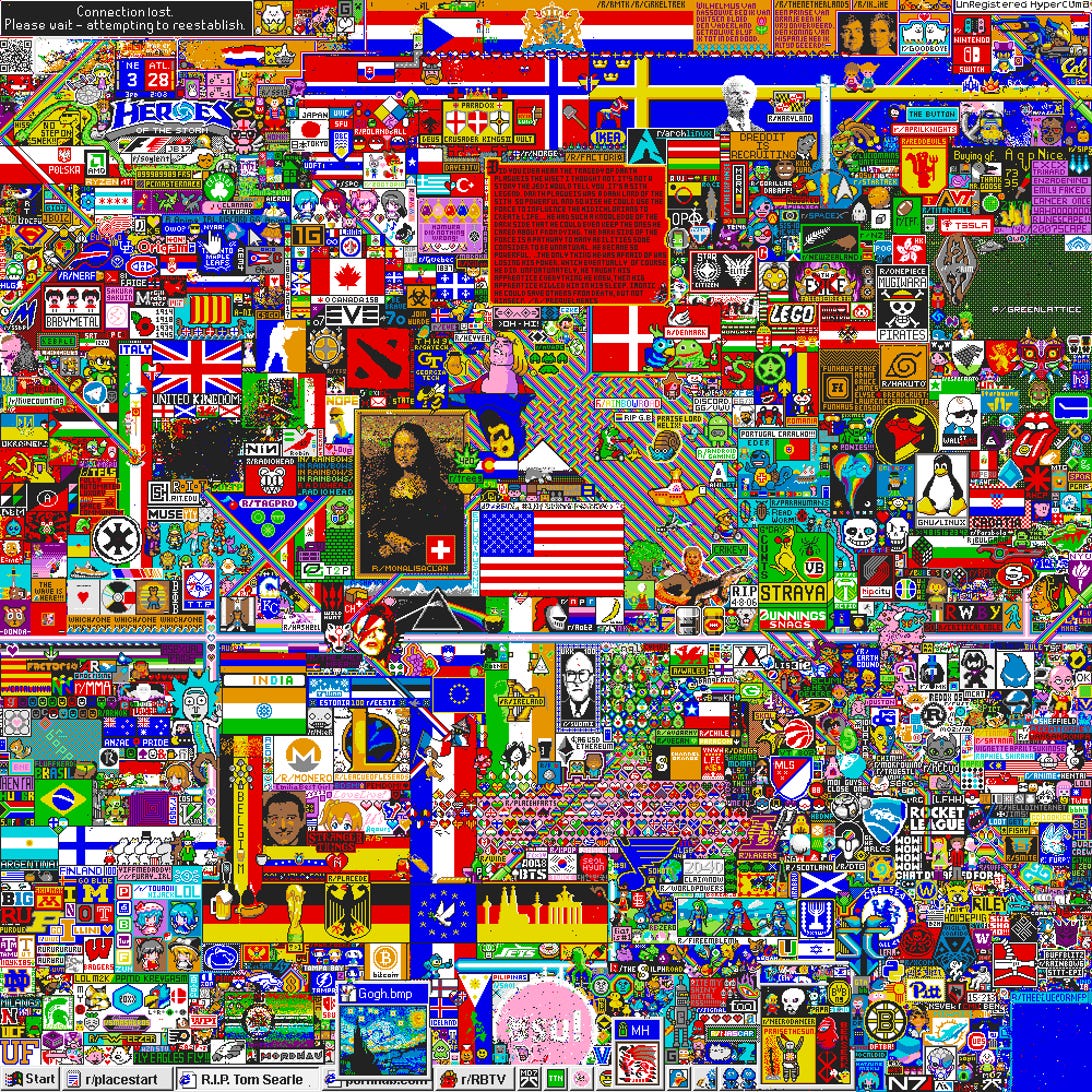What’s Wordle? Let’s start at the very beginning.
Seen all those posts featuring yellow, green and gray boxes on social media? Yep, that’s Wordle.
Here’s everything you need to know.
Post Contents
What is Wordle?
Wordle is a daily word game you can find online here. It’s fun, simple and, like a crossword, can only be played once a day. Every 24 hours there’s a new word of the day, and it’s up to you to figure out what it is. The site itself does a fantastic job of explaining the rules:

Wordle
Wordle gives players six chances to guess a randomly selected five-letter word. As shown above, if you have the right letter in the right spot, it shows up green. A correct letter in the wrong spot shows up yellow. A letter that isn’t in the word in any spot shows up gray.
You can enter a total of six words, meaning you can enter five burner words from which you can learn hints about the letters and their placements. Then you get one chance to put those hints to use. Or you can try for performance and guess the word of the day in three, two or even one go.
Simple stuff, but also incredibly compelling.
So it’s a word game? Big deal…
Yeah, it’s just a word game. But it’s super popular: Over 300,000 people play it daily, according to The New York Times. That popularity may sound perplexing, but there are a few tiny details that have resulted in everyone going absolutely bonkers for it.
There’s only one puzzle per day: This creates a certain level of stakes. You only get one shot at the Wordle. If you mess up, you have to wait until tomorrow to get a brand new puzzle.
Everyone is playing the exact same puzzle: This is crucial, as it makes it easier to ping your buddy and chat about the day’s puzzle. “Today’s was tough!” “How did you get on?” “Did you get it?” Which takes us to the next point…
It’s easy to share your results: Once you’ve successfully or unsuccessfully done the puzzle for the day, you’re invited to share your Wordle journey for the day. If you tweet the image, it looks like this…
⬜🟨🟩⬜⬜
⬜🟩🟩⬜🟩
⬜🟩🟩⬜🟩
⬜🟩🟩⬜🟩
🟩🟩🟩🟩🟩Wordle 184 5/6
Started to sweat a bit on this one!
— Paul is Happening (@paulpuccio) December 21, 2021
Note that the word and letters you chose are obscured. All that’s shown is your journey toward the word in a series of yellow, green and gray boxes.
It’s very compelling. If you get it easily, maybe in the second or third try, there’s a gloating element whereby you must show your followers how smart you are and share.
If you get it by the skin of your teeth in the sixth go, that’s also a cool story. But most importantly, the puzzle itself isn’t spoiled.
OMG IT HAPPENED
🟩🟩🟩🟩🟩
Wordle 184 1/6
— Jason Imms 🅽🅸🅲🅴 (@jasonimms) December 21, 2021
So Wordle isn’t just a word game, it’s a conversation starter and a chance to show off on social media. That’s why it’s going viral.
Tips and tricks
If you’re a word game purist, you may want to avoid the following tips and rely entirely on your own instincts. For everyone else who’s sick of seeing gray boxes, here are some tips that you may find helpful.
Choosing your first word: The first word is arguably the most important. To maximize the value of your opening gambit, choose a word with three vowels and five different letters. Some examples: orate, media, radio. I always use “adieu” for some reason. It’s a habit and I’m refusing to break it.
I just finished reading a fascinating piece by Tyler Glaiel, a programmer and game designer who tried to figure out the best possible starting word. Apparently we should all be kicking off Wordle with the word “roate.” Honestly, read this whole article, it’s great.
Avoid reusing grays: There’s a keyboard at the bottom of the Wordle board that shows what letters are green, yellow and gray. Avoid reusing letters that have come up gray. Yes, this sounds obvious. But it can take time and effort to think of five-letter words that don’t use letters you’ve already tried. That effort will pay off.
Letters can appear twice: This complicates matters, especially when you’re running out of letters to try on word four or five. But letters often recur, as with words like chill, sissy and ferry having been the correct answers in the past.
Who made Wordle?
Wordle is the work of software engineer Josh Wardle, who originally created the game for his partner, a fan of word games, and tells the BBC it will never become laden with ads. Extremely online people may remember Wardle as the creator of Place, an utterly wild collaborative art project/social experiment that sent the internet into a tizzy in April 2017.
Place was a shared online space that allowed literally anyone to fight over what was drawn there. It resulted in huge, sprawling communities battling over space on this gigantic online canvas.
It ultimately ended up looking like this:

Reddit
Wordle got a mention in The New York Times in November, but really got traction when the share element got added.
Added a share button to Wordle that generates a spoiler-free emoji grid for you. Shoutout to @irihapeta for inventing such a cool way to share your results each day.
👇
⬛⬛⬛⬛⬛
🟨⬛🟨🟩⬛
🟩🟩🟩🟩🟩Wordle 180 3/6
Try it out: https://t.co/pZTmeT1p7E
— Josh Wardle (@powerlanguish) December 16, 2021
In a Reddit post, Wardle said he wanted Wordle to feel like a croissant, a “delightful snack” that’s enjoyed occasionally. This is explicitly why there’s only one puzzle per day. “Enjoyed too often,” he explained, “and they lose their charm,” Wardle says.
Agreed.
New York Times acquisition
At the end of January, creator Josh Wardle sold Wordle to the New York Times for a figure “in the low seven figures.”
Wardle noted that his “game has gotten bigger than I ever imagined” and added he’s “just one person.”
The game will ultimately become part of New York Times subscription puzzle service, but Wardle made sure that Wordle would remain free-to-play and that current streaks would be preserved in the move.
“It is important to me that, as Wordle grows, it continues to provide a great experience to everyone,” Wardle said. “Given this, I am incredibly pleased to announce that I’ve reached an agreement with The New York Times for them to take over running Wordle going forward.”
Wordle hasn’t gotten harder since joining the New York Times
It just hasn’t! Come on folks!
According to The New York Times: “Nothing has changed about the game play,” the Times’ communications director, Jordan Cohen, said to CNET in an email.
If you check out the game’s script you can see that the New York Times hasn’t made any significant changes to the game.
Wordle clones…
Since the success of Wordle, there’s been clones. Lots of clones. Some have been cynical cash grabs, but a huge amount of them are unique, interesting alternatives.
- Worldle invites you to guess countries based on their outline.
- Squabble is a multiplayer, Battle Royale version of Wordle.
- Dordle forces you to solve two Wordles at once.
That’s just the tip of the iceberg. Here’s a fairly comprehensive list of word games you can check out if you get tired of the original.